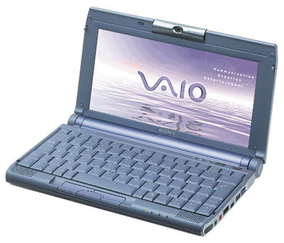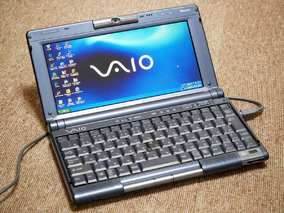C1 (Overview): Difference between revisions
More actions
No edit summary |
|||
| Line 80: | Line 80: | ||
== Downloads == | == Downloads == | ||
[https://archive.org/details/sony-vaio-pcg-c1-recovery-disc PCG-C1 First model] | |||
[https://archive.org/details/disk-1-of-2 PCG-C1VM] | [https://archive.org/details/disk-1-of-2 PCG-C1VM] | ||
[https://archive.org/details/vaio-pcg-c-1-xn-product-recovery PCG-C1XN UK] | |||
[https://archive.org/details/sony-pcg-c1xd-fr PCG-C1XD] | [https://archive.org/details/sony-pcg-c1xd-fr PCG-C1XD] | ||
[https://archive.org/details/sony-pcg-c1ve-fr PCG-C1VE] | [https://archive.org/details/sony-pcg-c1ve-fr PCG-C1VE French] | ||
[https://archive.org/details/sony-pcg-c1ve-recovery-cd_20241005 PCG-C1VE UK] | |||
[https://archive.org/details/pcg-c-1-xf-recovery-cds PCG-C1XF] | [https://archive.org/details/pcg-c-1-xf-recovery-cds PCG-C1XF] | ||
Revision as of 15:09, 24 December 2024
Overview
The Sony VAIO PCG-C1 PictureBook was a line of subnotebooks sold by Sony from 1998-2003.
It was branded as the "PictureBook", due to its inbuilt rotating camera (the first ever on a laptop) and book-shaped design. They were very light, weighing 1kg, during a time where most laptops were extremely heavy.
The PCG-C1 had a total of 4 revisions and 26 models including:
- Revision 1

PCG-C1 Original model - PCG-C1 (Pentium MMX 233MHz, 3.2GB HDD, 64MB RAM, 1024x480 TFT, 0.27MP camera, Windows 98, September 1998, Japan only, 5,000 units produced)
- PCG-C1X (Pentium MMX 266MHz, 4.3GB HDD, Windows 98, USA ONLY)
- PCG-C1F (PCG-C1X UK Variant)
- PCG-C1R (PCG-C1X Japan Variant)
- PCG-C1S (PCG-C1X Japan Variant)
- All units had mono speakers
- Revision 2

PCG-C1XE side view - PCG-C1XE (Intel Pentium 2 266MHz, 8.1GB HDD, 64MB RAM, Windows 98, 1999, JAPAN ONLY)
- PCG-C1XN (Intel Celeron 233MHz, 12GB HDD, 64MB RAM, Windows 98, January 2000, Global)
- PCG-C1XS (Intel Pentium 2 400MHz, 12GB MDD, 64MB RAM, Windows 98, January 2000, High end PCG-C1XN, Global)
- PCG-C1XD (PCG-C1XS German variant)
- PCG-C1XG/BP (PCG-C1XS Japanese variant)
- Changed design, Battery between display and keyboard to reduce thickness
- All units had stereo speakers
- Revision 3

PCG-C1VN - PCG-C1VN (Transmeta Crusoe TM5600 600MHz, 12GB HDD, 128MB RAM, ATI Rage Mobility 8MB, Windows ME, September 2000, Probably a USA variant)
- PCG-C1VE (Same as PCG-C1VN, Probably a European variant)
- PCG-C1VP (Transmeta Crusoe TM5600 667MHz, 15GB HDD, 15GB HDD, Windows 2000 Pro, March 2001)
- PCG-C1VFK (Same as PCG-C1VP but with integrated Bluetooth 1.0 adapter, Windows 2000 Pro, March 2001)
- PCG-C1VSX (Same as C1VP, except choice of 15 or 30GB hard drive, no external monitor support and Bluetooth 1.0, Windows 2000 Pro)
- PCG-C1VS/BW (Transmeta Crusoe 600MHz, 15GB HDD, 128MB RAM, included CD-RW PCMCIA Card, no Bluetooth, Windows ME, Office XP Preinstalled)
- All units shipped with a Transmeta Crusoe CPU and ATI Rage Mobility 8MB Graphics
- First revision with built in Memory-Stick slot
- Revision 4

PCG-C1MZX - PCG-C1MV (Transmeta Crusoe TM5800 733MHz, 20GB HDD, ATI Mobility Radeon M 8MB, 1280x600 TFT Display, Windows XP Home/Pro, September 2001)
- PCG-C1MW (Same as PCG-C1MV, but with Crusoe 867MHz and 30GB hard drive, August 2002)
- PCG-C1MGP (Same as PCG-C1MV, but with 30GB HDD, built-in Bluetooth 1.1, Windows XP Pro)
- PCG-C1MRX (Same as PCG-C1MV, but with 30GB HDD, built-in Bluetooth 1.1, bundled 802.11b Wi-Fi PC card and XP Home only)
- PCG-C1MR/BP (Same as PCG-C1MRX, but with Crusoe TM5600 667MHz CPU, 128MB memory, 20GB HDD and removes the built-in Bluetooth and bundled Wi-Fi card)
- PCG-C1MSX (Same as PCG-C1MW, Japanese variant)
- PCG-C1MEL (Same as PCG-C1MW, Korean variant)
- PCG-C1MAH (Same as PCG-C1MW, Hong Kong variant)
- PCG-C1MHP (Same as PCG-C1MW, European variant)
- PCG-C1MZX (Same as C1MSX, but with Transmeta Crusoe 933MHz. Final and most powerful PCG-C1 series model)
- Design refresh, dark purple instead of light purple, different button and keyboard design, brushed aluminum top
- All models included an upgraded 1280x600 screen
All PCG-C1 starting from the 2nd revision had a jog dial, to help with navigation seeing that the the laptop didn't have a scroll wheel.
Problems

A problem with this series and many other older ones is the so called "vinegar syndrome", which happens when the polarizer film from the LCD breaks down. This causes some nasty looking effects on the display, as well as a vinegar smell, hence the name "vinegar syndrome".
To fix this, you must replace the damaged polarizer film with a new one. A video and polarizer replacement is linked in the Resources tab.
As with a lot of old laptops, this laptop has the problem of melting rubber feet. There is no proper solution, apart from 3D-Printing the feet with TPU plastic. The STL can be found under the "Resources" tab. You could also use hot glue to make a replacement (video in resources tab).
Daily Usage Today
Today the PCG-C1, almost like back in the day, is just a novelty item. It lacks any kind of usage, being underpowered for tasks like retro gaming or video editing, the only thing it can do properly being text editing and other office tasks. Browsing old internet sites is also possible (HTML only).
It is a collector's item, so prices are steep. With enough patience it's still possible to find some good deals.
Resources
Polarizer replacement tutorial
Replacement rubber feet with glue gun
Replacement TPU feet model by Geoff (Designed for the first revision C1)
Replacement TPU feet model by Geoff (Designed for the 2/3/4th C1 revision)
We will soon create a video review showcasing some different models and their features.
Downloads
These Recovery Disks are model locked. We are very close to being able to patch them.
